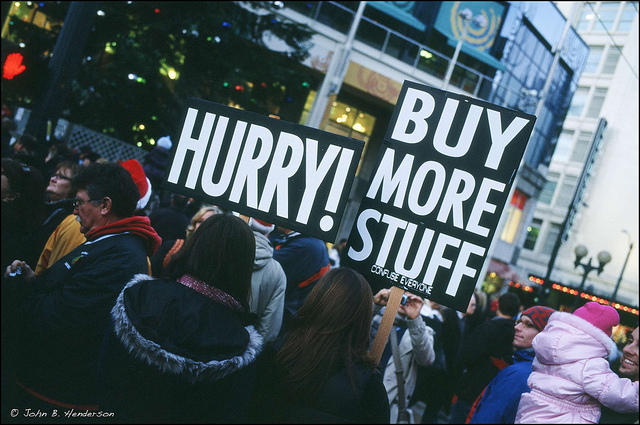I’m a Midwestern girl living in Ecuador.
I didn’t leave the U.S. like many expats I’ve met, worried about chemically-soaked foods, overwhelmed by the culture of consumerism, or frustrated with a government so polarized it sometimes ceases to function.
Instead, I moved here for a simple reason; my job as an editor allowed for remote working. Up for a new adventure, I decided to see what South American living would be like. I’ve been here for three years now, and I can say with certainty that one of the most surprising thing about my move has been how much it’s taught me about the United States.
Like a fish who only realizes she’s been living in water after she’s plucked from the bowl, I’m often shocked by how many things I once considered normal that now seem so, so strange.
Like Black Friday.
When my Ecuadorian friends ask me what exactly “Black Friday” is, at first, I offer the short version—that it’s the day after Thanksgiving when people start holiday shopping. But sometimes they want to know more. Like, why it’s called Black Friday, and why it happens immediately after “Thanks” giving? That’s where things start to unravel.
Truthfully, I hadn’t given an ounce of thought about how this might look to an outsider, but as I attempt to describe this whole ordeal without sounding completely ridiculous, I realize that it’s impossible.
I feel my face flush with embarrassment.
If I only tell the convenient details, Black Friday will be perpetuated as something to celebrate (yay gift-giving!). And that’s the last thing that I want. But at the same time, it’s so difficult to find a dignified way to tell them what it’s really about.
Because if I were to be completely honest, I’d have to tell them that despite just having celebrated gratitude, many Americans trade quality time with loved ones for a half-priced flat screen.
And I’d add that the day after our Thanksgiving celebration, if we check out the news (or watch any T.V. at all) we’ll undoubtedly be bombarded with images of violence and aggression, all inspired by our nation’s desire to have more. I might mention that many people believe that this is why it’s called “Black,” though other sources suggest that “Black” refers to when retailers begin to turn a profit, moving out of the red and into the “Black.”
Then, I’d have to say that throughout the day and even extending into the weekend, Americans will be constantly reminded of how well this year’s Black Friday is doing compared to last year’s—“well” being a word used to describe how superfluously we’ve spent, how many new things will enter our homes, and how many old will either be shoved in a corner or die in a landfill.
And it’s very possible that I’ll be having this conversation in a house made of bamboo, with nothing more than a couple of plastic chairs and a board with legs for furniture.
I don’t want to be one of those Americans that lives in a foreign country and finds pleasure in pointing out every little thing the U.S. could be doing better. The truth is, I absolutely love the States.
But as I leave the movie theater of a small coastal city in Ecuador, and I turn the corner to see a “Black Friday” sale sign plastered on one of the big glass windows, I absolutely want to throw up.
This “phenomenon” is spreading. In Canada, the UK, in Ecuador and surely in countless other places, people are taking yet another (unfortunate) cue from the U.S.
Celebrating a day of mass consumption is the last thing this planet needs right now. As tempting as it might be to take advantage of Black Friday sales, I urge you to rethink your decision or at least tread lightly.
What we do in the U.S. echoes around the world.
Though our practices are often backwards and downright environmentally-abusive, much of the world is still fed our television programs, our media and therefore our ideals.
While they don’t idolize us as much as the media might like us to believe—as we’re shown images of immigrants hurling themselves over imaginary borders (I know Ecuadorians who say they’d never visit the U.S. for fear of gun violence)—with the explosion of globalization, they’re still subjected to our cultural norms.
And as 2014 is shaping up to be the hottest year in recorded history on Earth, Americans continue to play for team global warming. We’re only five percent of the human population, yet we consume 24 percent of the world’s fossil fuel resources.
Sadly, I have to say that I’m happy Americans account for just a tiny slice of the world’s population. Can you imagine what the world would be like if everyone consumed like we do?
It might seem unfair to ask an entire nation to tone it down, when it’s probably true, that given the opportunity, many other nations would gladly consume the way that we do. But as one of the richest nations on Earth, our message is one of the loudest, whether we like it or not.
And, “With great power comes great responsibility.”
That’s what should be playing over the loud speakers at your nearest Wal-Mart.
It’s not too late to put your big kid pants on, America.
Really, we can do this.
Love elephant and want to go steady?
Sign up for our (curated) daily and weekly newsletters!
Author: Lucy Animus
Editor: Catherine Monkman
Images: John Henderson/Flickr



Read 8 comments and reply